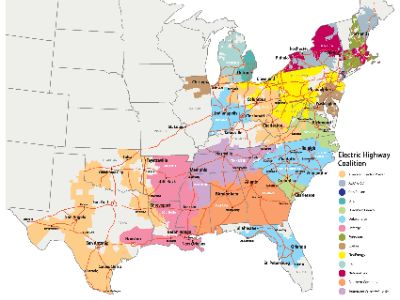
COLUMBUS, Ohio, July 26, 2021 – The Electric Highway Coalition (EHC) has doubled the number of companies committed to enabling long distance electric vehicle (EV) travel through a network of DC fast charging stations connecting major highway systems.
Membership in the EHC – which is committed to helping enable long distance all-electric travel by adding fast charging stations along U.S. highway routes – has now grown to include AVANGRID, Consolidated Edison, DTE Energy, Eversource Energy, Exelon, FirstEnergy Corp., ITC Holdings Corp., and National Grid. Formed in March 2021, EHC began its membership with American Electric Power (Nasdaq: AEP), Dominion Energy, Duke Energy, Entergy Corporation, Southern Co., and the Tennessee Valley Authority.
Together, the 14 members – representing 29 states and the District of Columbia and serving more than 60 million customers – are committed to growing corridor EV charging solutions within their service territories and working with other members to ensure the charging resources enabled EV drivers convenient charging options and seamless travel routes.
In addition to expanding membership, the EHC has further defined its goals and objectives while beginning cooperation in pursuit of their shared objective. The members have agreed to work together to ensure efficient and effective fast charging deployment plans that enable long distance EV travel, avoid duplication among coalition utilities, and complement existing corridor fast charging sites. Ideally, EHC members are pursuing sites that are easily accessible for drivers located less than 100 miles apart. The EHC is also committed to providing a positive charging experience for drivers, including having at least two charging stations with universal vehicle compatibility, and additional features where feasible, such as real-time status reporting for drivers and convenient payment collection. DC Fast charging stations are typically capable of getting drivers back on the road in 20-30 minutes. However, the member companies are working closely with stakeholders in their service territories to determine the best approaches to support effective EV charging buildout. Additionally, each member company will determine its own specific pricing models and select their own charging equipment providers.
“AEP helped bring the initial members of the Electric Highway Coalition together. In just a few months we have been able to more than double the number of companies who want to be part of this unprecedented effort,” said Nicholas K. Akins, AEP’s chairman, president and chief executive officer. “Every major car maker has announced production of EVs for every lifestyle – from pickup trucks to performance cars – and our industry is prepared to ensure that drivers can travel wherever the road takes them. Through the EHC, we can make sure that our nation’s charging infrastructure is built to enable travel and make the most efficient use of the energy grid.”
AEP has committed to replacing its 2,300 cars and light-duty trucks with EV models by 2030. Additional medium- and heavy-duty vehicles will transition to hybrid or electric alternatives as models become available. The charging network announced today also will enable AEP employees to use EVs to travel throughout the company’s 11-state service territory. AEP also is working with select customers across its service territory to help them understand the benefits of electrifying their own vehicle fleets or business processes.
Across its service territory, AEP is working with regulators to create programs that benefit all customers and support EV adoption, such as off-peak charging programs, incentives for charging station installations, energy efficiency rebates, and consultative services to encourage electrification.
In 2018, AEP Ohio launched a $10 million program to deploy 375 charging stations in partnership with local governments, workplaces and multi-family dwellings to increase publicly available charging sites and demonstrate the benefit of public-private partnerships as part of the Smart Columbus initiative. The program included a requirement to locate 10% of the charging stations in low-income areas, a benchmark that was exceeded.
In 2020, Indiana Michigan Power began offering its IM Plugged In program to address residential, multi-family dwelling, fleet and workplace charging, as well as corridor fast charging. The program offers customers rebate programs that reduce EV charging infrastructure costs and EV-specific off-peak rates.
Appalachian Power offers a residential off-peak charging program for Virginia customers. Customers also receive credits for EV charging that takes place during off-peak periods, such as overnight.
Additionally, residential customers of Public Service Company of Oklahoma and Southwestern Electric Power Company in Louisiana and Texas are eligible for energy efficiency rebates on qualified EV chargers.
The Electric Highway Coalition welcomes interested utilities to join as it seeks to extend the reach of network. Additionally, it supports, and looks forward to working with, other regional utility transportation corridor electrification initiatives.
American Electric Power, based in Columbus, Ohio, is powering a cleaner, brighter energy future for its customers and communities. AEP’s approximately 16,800 employees operate and maintain the nation’s largest electricity transmission system and more than 223,000 miles of distribution lines to safely deliver reliable and affordable power to 5.5 million regulated customers in 11 states. AEP also is one of the nation’s largest electricity producers with approximately 30,000 megawatts of diverse generating capacity, including more than 5,600 megawatts of renewable energy. The company’s plans include growing its renewable generation portfolio to approximately 50% of total capacity by 2030. AEP is on track to reach an 80% reduction in carbon dioxide emissions from 2000 levels by 2030 and has committed to achieving net zero by 2050. AEP is recognized consistently for its focus on sustainability, community engagement, and diversity, equity and inclusion. AEP’s family of companies includes utilities AEP Ohio, AEP Texas, Appalachian Power (in Virginia and West Virginia), AEP Appalachian Power (in Tennessee), Indiana Michigan Power, Kentucky Power, Public Service Company of Oklahoma, and Southwestern Electric Power Company (in Arkansas, Louisiana, east Texas and the Texas Panhandle). AEP also owns AEP Energy, which provides innovative competitive energy solutions nationwide. For more information, visit aep.com.